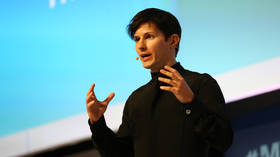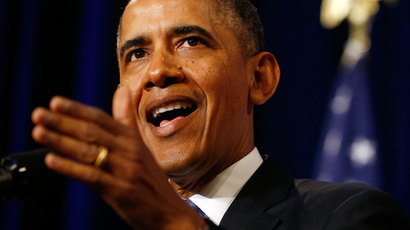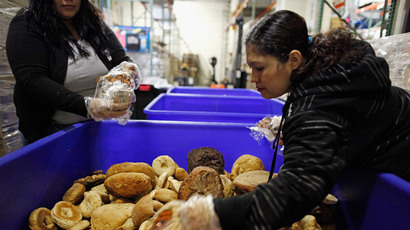Widening income gap in US 'unsustainable' but unlikely to improve

The widening gap between America’s richest and the middle and working classes is unsustainable and is unlikely to improve a survey released on Monday by the Harvard Business School has found.
The study which is called “an economy doing half its job” said that while large American companies were showing signs of recovery and were maintaining their competitive edge on the world stage, many middle and working class US citizens were struggling, as were small businesses.
The new survey was designed by the Harvard Business School (HBS) and is the latest in a series of surveys on their US Competiveness Project. Every year HBS asks alumni worldwide to share their views about the state and future of the US business environment and US competiveness. In addition to this, the 2013-2014 survey also focused on three key areas: competitiveness, education, workforce skills and transportation infrastructure.
On balance respondents were pessimistic about the trajectory of US competitiveness. 47 percent saw a decline in the next few years, while just 33 percent thought things would improve.But respondents were less negative than in past surveys. For example, in 2011, 71 percent thought US competitiveness would deteriorate.
Jan W Rivkin, co-chair of the project, said the findings of the 2013-14 survey showed that while firms might be looking healthier citizens were likely to be struggling more and more.
“American workers are captives of the weakest aspects of the US business environment, our polarized politics and our struggling systems for educating young people and developing their workplace skills. Firms in contrast are beneficiaries of our nation’s greatest strengths – like our research universities and vibrant capital markets,” he said.
His views were echoed by Michael E Porter who also co-chaired the project. He said that while US firms are wining in global markets they are not lifting the living standards of the average American worker.
Porter cautioned that US firms should not be satisfied with flat or falling living standards for their workers.
“Shortsighted executives may be satisfied with an American economy where firms operating here are winning without lifting US living standards. But leaders with longer perspectives understand that companies can’t thrive for long while their workers and their communities struggle,” said Professor Porter.
The report found that thriving citizens are not only more productive employees but also more willing consumers, whereas “struggling citizens are disgruntled at work, frugal at the cash register, and anti-business at the ballot box.”
The project also looked at the K-12 education system, primary and secondary education, and how it engages with business. The authors found that while involvement in America’s schools is broad, it is not particularly deep. 63 percent of respondents said that the firm they work for participates in at least something to support schools, but only 7 percent reported that their firm was deeply involved in public education.
Business leaders are also in general reluctant to hire full-time workers and instead prefer to use technology to perform the jobs of people, outsource to contract workers or third parties, or hire part time workers.
The authors advised that businesses must do more than checkbook philanthropy and could work much more effectively with educators to guide young people from school to career.
Transport infrastructure was also found to be lacking in the US compared to other advanced economies. Forty-two percent of respondents said that they thought the condition of infrastructure, such as airports, roads and railways, had declined over the past three years.
In order to counter this, business leaders suggested developing a national infrastructure strategy.
Overall the authors found that in order to make the average American more productive and to be able to command better wages in global labor markets, US business leaders need to move away from an opportunistic patchwork of projects towards a more strategic and collaborative approach.














